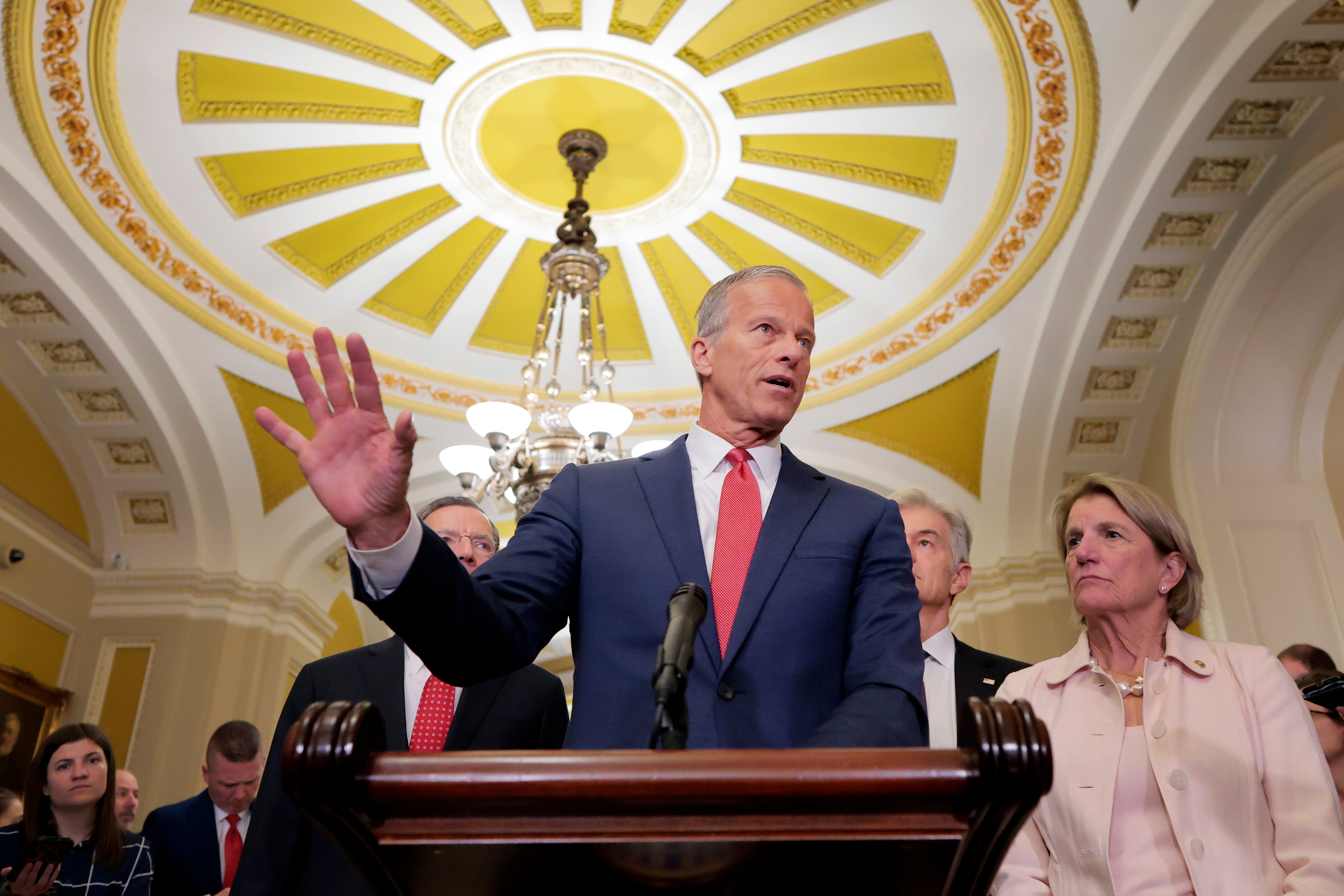While Republicans largely fall in line behind President Donald Trump as he disregards experts and prepares for the United States to take on a larger role in Israel’s war with Iran, using the pretense of nuclear weapons being built, Democrats are seeing flashbacks of the Iraq War.
On Thursday, the White House said that the president would make his decision on whether to strike Iran in the next two weeks. This comes as the president has directly contradicted Director of National Intelligence Tulsi Gabbard on whether Iran is actively building a nuclear weapon.
That raised alarms for Sen. Mark Warner (D-Va.), the vice chairman of the Senate Intelligence Committee.
“If this president wants to completely ignore the intelligence community, we are playing in dangerous ground, and this is exactly the way we got ourselves into Iraq,” he told The Independent on Thursday.
The parallels are quite stark.

In 2002, in the wake of the 9/11 terrorist attacks, President George W. Bush insisted that Iraq had weapons of mass destruction. At the time, the Bush administration maintained that Iraq posed an existential threat, with Secretary of State Colin Powell making the case in a presentation before the United Nations.
After the United States invaded Iraq, it found little evidence of any weapons of mass destruction.
Now, Warner’s Democratic colleague from Virginia, Sen. Tim Kaine, has introduced a war powers resolution that would trigger debate and a vote for any military action against Iran.
“No one in Congress should on a matter of war, just say, let the President do what they want,” he told The Independent.
“The president can engage in self defense without an authorization, but the notion that we're being asked to join a bombing campaign in Iran is clearly offensive. I think it was. It's a horrible idea, but if my colleagues think it's a good idea, I think they should introduce war authorization.”
Only six senators who voted against the Iraq War — either as members of the House of Representatives or as senators — remain in the Senate.
“We've discovered, particularly Middle East, it's easier to break things hard to put them together,” said Sen. Jack Reed, the top Democrat on the Senate Armed Services Committee.
“So, and we've seen operations like the invasion of Iraq under George W. Bush, which for the first few weeks looked like it was brilliant. Nothing happened. And four years later, we were wondering, what are we doing here and how do we get out?”

By contrast, 14 senators in either capacity voted for the Iraq War. Senate Majority Leader John Thune voted for it as a member of the House and Senate Minority Leader Chuck Schumer, then in his first term in the Senate, voted for it.
In addition, Schumer is considered a hawk on Israel and Iran, having opposed the 2015 Joint Comprehensive Plan of Action, the agreement brokered by the Obama administration and US allies to curb Iran’s nuclear ambitions.
The number of senators who remember the mistakes of Iraq continues to dwindle. Sen. Dick Durbin of Illinois, the Senate minority whip who voted against it, is retiring at the end of next year. Sen. Adam Schiff of California, a veteran congressman who became a senator last year, voted for the war as a member of the House.
One of the opponents of the Iraq war who remains is Sen. Ron Wyden of Oregon, who sits on the Senate Intelligence Committee. Wyden voted against Gabbard’s confirmation, but still criticized Trump.
“This wouldn't be the first time where Donald Trump has done an about face on foreign policy,” Wyden told The Independent.
Sen. Bernie Sanders, the independent from Vermont who voted against the war as a congressman, who had his own resolution, joined onto Kaine’s resolution.
But even Democrats who came to Congress afterward, particularly those shaped by the War on Terror, want to rein in the president. Sen. Elissa Slotkin, a freshman from Michigan, joined the CIA after the September 11 attacks partly because she lived in New York on the day of the attack.
Slotkin led a war powers resolution after Trump launched a strike that killed top Iranian military official Qasem Soleimani. She said she is looking at Kaine’s language.
“I think Congress, ever since the Iraq War, has been scared to exercise their oversight role in war and Democrats and Republicans,” she told The Independent. “So I've been pretty consistent that we need to get back to that.”
By contrast, so far, few Republicans save for Sen. Rand Paul of Kentucky have raised reservations about war with Iran. Paul’s father, former congressman Ron Paul, voted against the War in Iraq.
Below is a list of Senators who voted for and against the War in Iraq who remain in Congress.
Yes as Senators:
- Maria Cantwell (D-WA)
- Susan Collins (R-ME)
- Mike Crapo (R-ID)
- Grassley (R-IA)
- Mitch McConnell (R-KY)
- Chuck Schumer (D-NY)
Yes in the House:
- Adam Schiff (D-CA)
- John Boozman (R-AR)
- Lindsey Graham (R-SC)
- John Thune (R-SD)
- Roger Wicker (R-MS)
- Jerry Moran (R-KS)
- Ed Markey (D-MA)
- Shelly Capito (R-WV)
Senators who voted No:
- Dick Durbin (D-IL)
- Patty Murray (D-WA)
- Jack Reed (D-RI)
- Ron Wyden (D-OR)
Democrats who voted No as House members:
- Bernie Sanders (I-VT)
- Tammy Baldwin (D-WI)

 6 hours ago
4
6 hours ago
4









